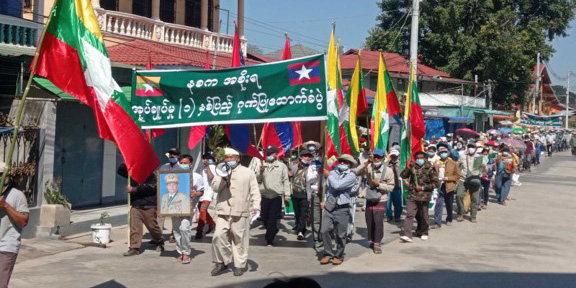Two people were killed and 38 injured in a grenade attack as crowds returned from a pro-military rally in the eastern Myanmar town of Tachileik, a security official told AFP as anti-coup protests were held across the country on the first anniversary of the military’s power-grab.
Local media also reported the incident that took place around noon in eastern Shan State, a region of the country that has seen comparatively little coup-related violence.
No group has so far claimed responsibility for the attack, which took place as anti-coup activists marked the coup’s anniversary with a silent strike and clapping protests, defying junta orders.
The military takeover that ended the Southeast Asian country’s brief democratic interlude and toppled civilian leader Daw Aung San Suu Kyi has triggered mass protests and a crackdown on dissent.
Struggling to contain the backlash and contending with daily clashes, the junta has killed more than 1,500 civilians, according to a local monitoring group. Swathes of the country are under the control of anti-coup fighters.
Residents across commercial hub Yangon and in the city of Mandalay clapped en masse at 4 p.m. Tuesday, AFP correspondents and locals said, marking the end of a “silent strike” against the coup.
“We were clapping,” one Mandalay resident said. “Other houses in my neighbourhood clapped as well.”
Ten people were arrested for taking part in the clapping protest in Yangon, local media reported.
The junta ordered shops to stay open Tuesday but the streets of Yangon began emptying at 10 a.m., a scene that was repeated in Mandalay and the southern Tanintharyi Region.
Mandalay’s famous jade market opened in the morning but saw little traffic, a resident told AFP.
“I’m staying at home playing online games to participate in the silent strike.”
A similar shutdown in December emptied the streets of cities and towns across the country, but Tuesday’s was also marked by violence against the junta.
‘Thunderous silence’
Ahead of the anniversary, the junta had threatened to seize businesses that shuttered and warned that noisy rallies or sharing anti-military “propaganda” could lead to treason or terrorism charges.
“If the strike is shaping up as is reported, it is a thunderous silence, a resounding rebuke of military rule,” David Mathieson, an analyst formerly based in Myanmar, told AFP.
On Tuesday morning, local media showed isolated flash mobs in Yangon and Mandalay, where protesters unfurled pro-democracy banners and set off flares.
Photos released by the junta’s information team on Tuesday painted a picture of normalcy in the country, including competitors finishing a marathon in the southern Bago Region and a religious celebration.
Undated video handouts showed pro-military demonstrations in unspecified parts of the country, some holding national flags and chanting slogans in support of the army.
Others held banners denouncing the People’s Defense Forces that have sprung up to fight the military, and which have dealt painful blows to junta troops with guerilla ambushes and mine attacks.
Sanctions
The United States, Britain and Canada unveiled coordinated sanctions on Myanmar officials Monday, including those involved in the trial of ousted leader Daw Aung San Suu Kyi.
Washington sanctioned Attorney General Thida Oo, Supreme Court Chief Justice Tun Tun Oo and Anti-Corruption Commission chairman Tin Oo, all of whom it said were closely involved in the “politically motivated” prosecution of Daw Aung San Suu Kyi.
Citing “unspeakable violence against civilians”, the undermining of regional stability and “rampant” corruption, US President Joe Biden said he was working with allies to “hold accountable” those responsible.
But the UN’s Special Rapporteur on Myanmar said the international community needed to do more.
“The fact that one year has elapsed with no Security Council Resolution imposing a comprehensive arms embargo—as arms continue to flow to the junta and kill innocent people—is unacceptable,” said Tom Andrews.
“The people of Myanmar deserve better from the United Nations.”
Another trial for Daw Aung San Suu Kyi
Suu Kyi has been detained since the coup, and faces a raft of charges from election fraud to breaching the Official Secrets Act, and faces over 100 years in jail.
The day before the anniversary, the junta announced the Nobel laureate will face a new trial for electoral fraud during the 2020 polls, in which her National League for Democracy (NLD) trounced a military-backed rival.
Several senior members of the national electoral commission have also been arrested since the coup, accused of masterminding the NLD’s landslide victory.
The junta canceled the results of the 2020 election in July last year, saying it had found some 11.3 million instances of fraud.
Independent monitors said the polls were largely free and fair.
You may also like these stories:
Myanmar’s CDM, Shadow Govt Among Nobel Peace Prize Nominees
Myanmar Junta Leader Endorses Proportional Representation Election System
US Enforces Fresh Sanctions on Myanmar Junta and its Cronies

















